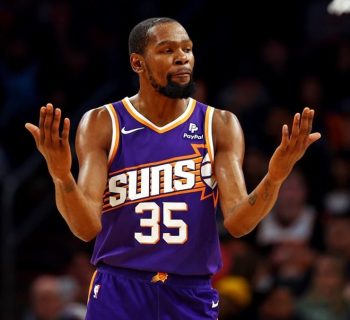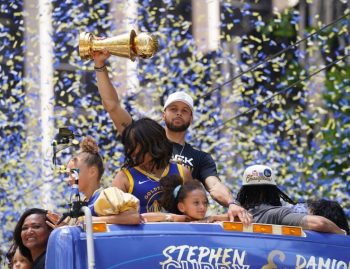NBA
NBA Sunday: Ben Simmons and the Early and Incalculable Impact

With Friday night’s 121-110 victory over the Indiana Pacers, the Sixers pulled themselves above the .500 mark for the first time since Evan Turner was a starter for the team.
Although the mighty Joel Embiid has been quite impressive, it’s now okay to begin buying stock in Ben Simmons. The team’s declaring their rebuild to be all but over has just as much to do with him as it does Embiid, if not more.
While both Simmons and Embiid possess unique traits and qualities, Simmons’ rare combination of size, agility and ball handling is uniquely cut from the mold of LeBron James. Embiid, while gifted in almost every way, doesn’t have the ability to take smaller players off the dribble in order to effectively create for his teammates. Simmons can also play as the ball handler in pick-and-roll situations and function as a break starter off of a rebound.
Through just nine games, to say that Simmons’ impact has been felt would be an understatement. He’s averaging an unreal 18 points, 9.8 rebounds, 8.2 assists and 1.6 steals per game and, most importantly, has managed to stay on the floor for 35 minutes per contest.
As most NBA youngsters will agree, the “rookie wall” is a real thing. Most neophytes entering the league aren’t accustomed to the gauntlet that is the NBA season and often show signs of progressive fatigue around the 50-game mark. Often times, they never recover.
For Simmons, though, the early returns have been truly remarkable. Currently second on the Sixers in scoring (he trails Embiid’s 20.5 points per game), Simmons may have a realistic shot at becoming just the first rookie in NBA history to average as many as 18 points, eight assists and eight rebounds per game since Oscar Robertson. That’s something that not even James was able to accomplish as a rookie.
In fact, in NBA history, aside from Robertson, only two other rookies have managed as many as 16 points, six rebounds and six assists—Magic Johnson and… wait for it… Michael Carter-Williams.
Sixers fans, without question, are familiar with Carter-Williams. Similarly to Tyreke Evans, they are rare examples of NBA players who appear to have peaked as rookies. The idea of “peaking” in one’s first year, of course, is a bit strange. Traditionally, NBA players spend their first two seasons merely learning the rigors of their lives as professionals and adjusting to the pace of the game and the way that their travel schedules impact their bodies and ability to perform 90 times per year.
In hindsight, we know that the major issue with Evans was merely that his body wasn’t cut out for the long grind of an NBA season. Evans, as you may recall, was similarly impressive in his rookie campaign, joining Oscar Robertson, Michael Jordan and LeBron James as the only other three rookies in NBA history to accomplish per-game averages of 20 points, five rebounds and five assists. Still, as he enters his ninth season, Evans has played in just 482 of 660 regular season games—just 73 percent. It should also be pointed out that he was not 100 percent healthy for a fair number of games he did play in, as well. The evidence suggests that it’s fair to say he hasn’t been the epitome of an ironman.
Carter-Williams, on the other hand, appears to have merely reaped the benefits of being a player on a non-contending team who always had the ball. There’s a keen difference between averaging 20 points per game on a 15-win team and averaging the same on a 50-win team. Teams that win 50 games are more likely to be involved in close games where defenses are active and engaged. More often than not, their games matter. Meanwhile, there are scores of NBA players who relish getting playing time in blowouts. When one’s team is trailing by 25 points and there are six minutes remaining in the game’s fourth quarter, a meaningless eight points can go a long way toward boosting a career average and securing a future contract.
Before this becomes about Carter-Williams and what he brings to the table, the record should reiterate the central point: he and Evans serve as this generation’s shining example of why it’s not wise to anoint a rookie to be a “future Hall-of-Famer” based on what he shows in his rookie year, much less the first few years of his career.
…But it is fair to salivate at the potential.
As it relates specifically to Simmons, it is he, both in stature, characteristics and effectiveness, that is the closest thing we’ve seen to LeBron James.
Since James’ entry into the league in 2003, we have seen a fair number of trans-generational NBA stars enter the league—Kevin Durant and Stephen Curry certainly qualify, while Russell Westbrook and Anthony Davis may if they finish their careers with multiple championships. Simmons, though, is the closest thing. That probably has something to do with why James and Simmons have become close, and it’s also something that a fair few around the league have noticed.
What’s most interesting about Simmons, though, is not who he is, but who he can become.
Had LeBron been born 20 years earlier, we may have had the pleasure of seeing him and Hakeem Olajuwon join forces.
Instead, we may have to settle for Simmons and Embiid, for each of these two, the ceiling is that high.
* * * * * *
As the season continues on, Thanksgiving approaches. Along with Christmas, the holiday is the first of the two poles of the NBA season—general managers take inventory, start looking at the standings and consider their team’s immediate futures.
Generally speaking, it’s premature to begin discussing All-Star berths and such prior to that point, but it’s safe to say that Simmons, if he continues giving us what we’ve seen thus far, will be considered along with Al Horford, Kristaps Porzingis and Andre Drummond as reserve front court players from the Eastern Conference.
And depending on how things shake out, LeBron James—who will almost certainly be one of the captains of this year’s All-Star Game—may have an opportunity to select his doppelgänger to be his running mate.
It wouldn’t be quite fair to say that we’ve never seen a player like Simmons before, because we have. His name is LeBron.
That we can even mention Simmons in the same breath as James is just as remarkable as it is appropriate.
Hopefully, the future will be kinder to him than the past has been to Evans and Carter-Williams.













